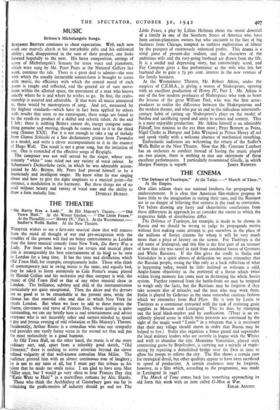THE CINEMA
"The Defence of Tsaritsyn." At the Tatler.-4, March of Time." At the Empire.
OUR allies seldom share our national fondness for propaganda by understatement. It is clear that American film-makers propose to leave little to the imagination in stating their case, and the Russians are in no danger of believing that coyness is the road to conviction. Yet before drawing any hasty and chauvinistic conclusions from these differences in approach let us consider the extent to which the respective fields of distribution differ.
The Defence of Tsaritsyn, for example, is made to be shown in Russia and we should be wrong to judge its propaganda merits without first making some attempt to put ourselves in the place of the millions of Soviet citizens for whorl' it will be very much more than a piece of history on the screen. For Tsaritsyn is the old name of Stalingrad, and this film is the first part of an account of how that city was saved in 1918 from combined forces of Germans and White Russians. If the film gives the credit to Stalin and Voroshilov in a spirit almost of deification we must remember that the Russian people, seeing the film only as a back reflection of what is happening today, would be little inclined to welcome a cold, Anglo-Saxon objectivity in the portrayal of a threat which twice within living memory has come near to destroying the whole Soviet system. Further removed from the battle-front we may be tempted to weigh only the facts, but the Russians may be forgiven if they take account also of miracles and the men who may work them. Stalin is played by Gelovani in the same somewhat cautious fashion which we remember from Red Flyer. He is sent by Lenin to Tsaritsyn as a commissar entrusted with the task of restoring grain supplies to Moscow and Leningrad. This he does by stamping out the local black-market and by confiscation. (There is an ex- cellently played scene in which three peasants are convinced by the sight of the magic word "Lenin" in a telegram that it is necessary that their tiny village should starve in order that Russia may be helped to live.) Stalin also organises a home guard and supersedes the local military leaders who are secretly in league with the Whites and wish to abandon the city. Meantime Voroshilov, played with contrasting gusto by Bogolyubov, is carrying out a miracle of engin- eering by repairing a demolished bridge over the Don in time to allow, his troops to relieve the city. The film shows a certain care for strategical detail, but other qualities appear to have been sacrificed to speed of production. A certain crudeness may be forgiven, however, in a film which, according to the programme, was made in Leningrad in 1942! The March of Time comes back into something approaching its old form this week with an item called G-Men at War. ,
EDGAR ANSTEY.


























 Previous page
Previous page